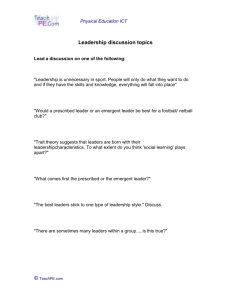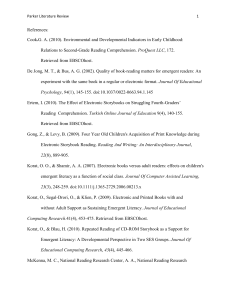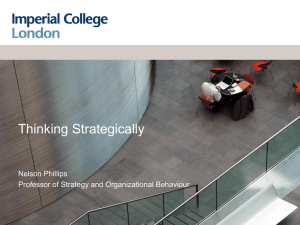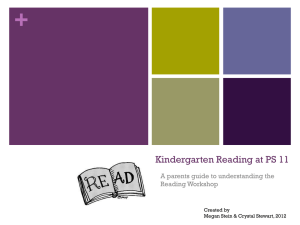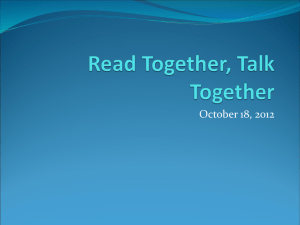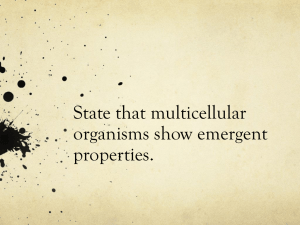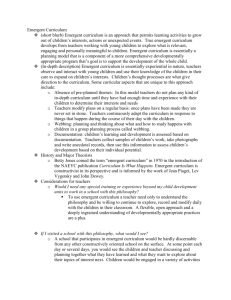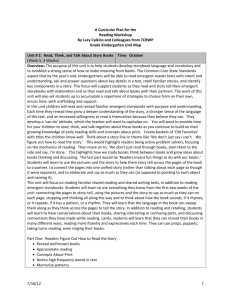Unit 2: Emergent Storybooks Resources
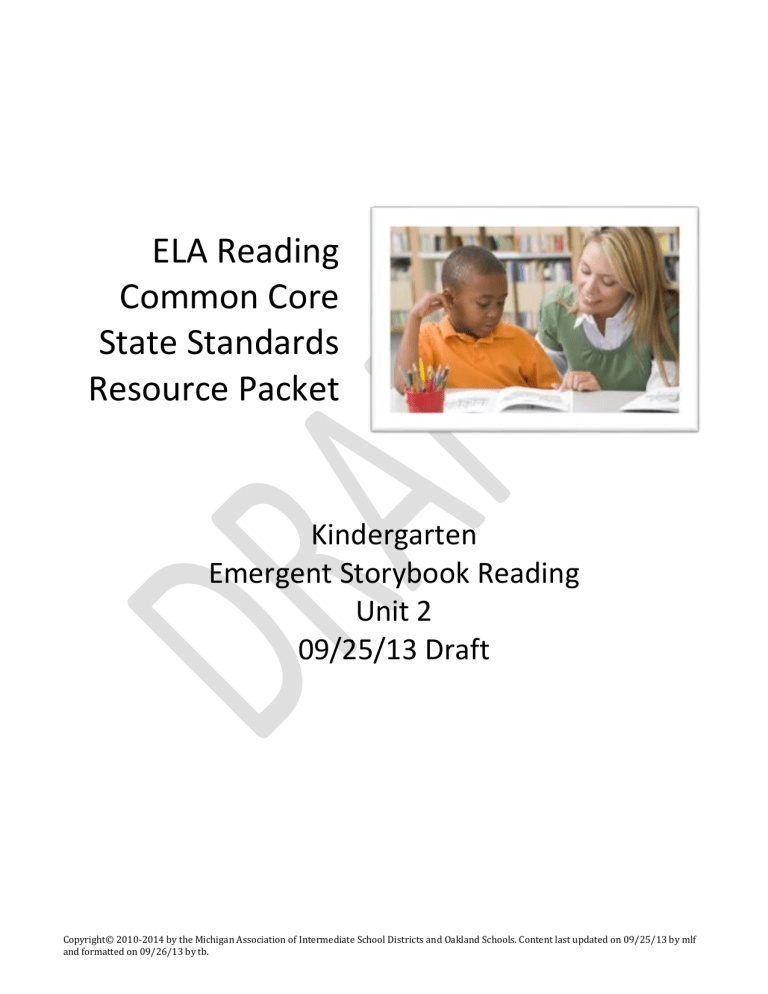
ELA Reading
Common Core
State Standards
Resource Packet
Kindergarten
Emergent Storybook Reading
Unit 2
09/25/13 Draft
Copyright© 2010-2014 by the Michigan Association of Intermediate School Districts and Oakland Schools. Content last updated on 09/25/13 by mlf and formatted on 09/26/13 by tb.
Table of Contents
Emergent Storybook Reading ......................................................................................................................................................1
Possible Anchor Charts …………………………………………………………………………………………………………………………………………………………5
Partner Power! .............................................................................................................................................................................6
Readers Stretch Themselves to Read with Stamina and Focus ....................................................................................................7
Emergent Story Book Observation Class Checklist Assessment ...................................................................................................8
Copyright© 2010-2014 by the Michigan Association of Intermediate School Districts and Oakland Schools. Content last updated on 09/25/13 by mlf and formatted on 09/26/13 by tb.
Emergent Storybook Reading
Copyright© 2010-2014 by the Michigan Association of Intermediate School Districts and Oakland Schools. Content last updated on 09/25/13 by mlf and formatted on 09/26/13 by tb. 1
Emergent Storybook Directions
Select a core of 15 emergent story books
Order multiple copies (4 or 5) of each book.
Provide storage space for emergent story books within easy reach of students.
Set your personal schedule for reading the books.
Read the first book and reread the book four times over a two week period. You can start the new book the next day but each book should be read four times over two weeks. Do this until you have enough books for all students.
Relax your schedule of the other new books over the rest of the year.
Invite your students to read.
Copyright© 2010-2014 by the Michigan Association of Intermediate School Districts and Oakland Schools. Content last updated on 09/25/13 by mlf and formatted on 09/26/13 by tb. 2
Books to use for Emergent Storybook Reading
Caps for sale by Esphyr Slododkina
The Three Billy Goats Gruff by Paul Galdone
Big Al by Andrew Clements
Will I have a Friend? by Mariam Cohn
Bunny Cakes by Rosemary Wells
Peter’s Chair by Ezra Jack Keats
Harry the Dirty Dog by Gene Zion
Red Riding Hood by James Marshall
Corduroy by Don Freeman
Leo the Late Bloomer by Robert Kraus
Carrot Seed by Ruth Krauss
Are You My Mother? By P.D. Eastman
The Lion and the Little Red Bird by Elisa Kleven
The ginger Bread Boy by Paul Galdone
Jamaica Tag Along by Juanita Havill
The Little Red Hen by Paul Galdone
Hansel and Gretel by James Marshall
Extraordinary Egg by Leo Lione
Snowy Day by Ezra Jack Keats
Where the Wild Things Are by Maurice Sendak
Alexander and the Terrible, Horrible, No Good Very Bad Day by Judith Viorst
Bedtime Story by Mem Fox
Owl Babies by Martin Waddell
Cosmo Zooms by Arthur Howard
The Kissing Hand by Audrey Penn
Cookie Store Cat by Cynthia Rylant
Froggy Gets Dressed by Jonathan London
The enormous Carrot by Vladamir Vagin
Kitten’s First Full Moon by Kevin Hemkes
Max’s Dragon Shirt by Rosemary Wells
Bunny Party by Rosemary Wells
Carry Me by Rosemary Wells
Hondo and Fabian by Peter McCarty
Hondo Escapes by Peter McCarty
Kiss Good Night by Amy Hest
Don’t You Feel Well Sam by Amy Hest
You Can Do it Sam by Amy Hest
Copyright© 2010-2014 by the Michigan Association of Intermediate School Districts and Oakland Schools. Content last updated on 09/25/13 by mlf and formatted on 09/26/13 by tb. 3
Sample Emergent Storybook Reading Schedule
Below are two examples of possible rotation schedules for reading Emergent Storybooks. Teachers need to make reading
Emergent Storybooks best fit their own classroom schedule. The titles listed below are only suggestions of possible Emergent
Storybooks. Teachers may use any Emergent Storybooks that are available to them.
Monday
Caps for Sale (1 st read)
Caps for Sale (2 nd read)
Monday
Big Al (3 rd read)
Big Al (4 th read)
Sample #1- Week #1 Rotation
Tuesday
Caps for Sale (3 rd read)
Caps for Sale (4 th read)
Wednesday
The Three Billy
Goats Gruff (1 st read)
The Three Billy
Goats Gruff (2 nd read)
Thursday
The Three Billy
Goats Gruff (3 rd read)
The Three Billy
Goats Gruff (4 th read)
Tuesday
Will I have a Friend?
(1 st read)
Will I have a Friend?
(2 nd read)
Week #2 Rotation
Wednesday
Will I have a Friend?
(3 rd read)
Will I have a Friend?
(4 th read)
Thursday
Bunny Cakes (1 st read)
Bunny Cakes (2 nd read)
Friday
Big Al (1 st read)
Big Al (2 nd read)
Friday
Bunny Cakes (3 rd read)
Bunny Cakes (4 th read)
Monday
Peter’s Chair (1 st read)
Harry the Dirty Dog
(1 st read)
Monday
Corduroy (1 st read)
Leo the Late
Bloomer (1 st read)
Sample #2- Week #1 Rotation
Tuesday
Peter’s Chair (2 nd read)
Harry the Dirty Dog
(2 nd read)
Wednesday Thursday
Peter’s Chair (3 rd read)
Harry the Dirty Dog
(3 rd read)
Peter’s Chair (4 th read)
Harry the Dirty Dog
(4 th read)
Tuesday
Corduroy (2 nd read)
Leo the Late
Bloomer (2 nd read)
Week #2 Rotation
Wednesday Thursday
Corduroy (3 rd read)
Leo the Late
Bloomer (3 rd read)
Corduroy (4 th read)
Leo the Late
Bloomer (4 th read)
Friday
Red Riding Hood (1 st read)
Red Riding Hood
(2 nd read)
Friday
Red Riding Hood
(3 rd read)
Red Riding Hood
(4 th read)
Copyright© 2010-2014 by the Michigan Association of Intermediate School Districts and Oakland Schools. Content last updated on 09/25/13 by mlf and formatted on 09/26/13 by tb. 4
Possible Anchor Charts for the Unit
Readers Read and Think About Books by...
Pointing to pictures
Ways we talk about books…
Strong feelings
Connections Saying what they see
Think and read
Rereading
Connecting the pages
Characters
Say more
Show evidence
Readers make their reading interesting by…
Changing voice to sound like character
Acting out their favorite parts
Reading like a storyteller
Copyright© 2010-2014 by the Michigan Association of Intermediate School Districts and Oakland Schools. Content last updated on 09/25/13 by mlf and formatted on 09/26/13 by tb. 5
Partner Power!
Readers sit close to partner reading
Readers stay with partner reading
Readers have one book in the middle reading
Readers act out characters
Readers act out and gesture informational text
Readers make a plan
Readers 1 – 2 – 3 or LOOK LISTEN SAY something back
Copyright© 2010-2014 by the Michigan Association of Intermediate School Districts and Oakland Schools. Content last updated on 09/25/13 by mlf and formatted on 09/26/13 by tb. 6
Readers Stretch Themselves to Read with Stamina and Focus
Did we reach our reading minutes?
This chart could be a timeline to 30 minutes with a moving clock or star as readers gain more minutes. It could also be a bar graph or pie chart that is filled in by numeric increments as readers gain more minutes. The important part is that minutes are being collected; expectations are increased, and charted so that readers see the expectation and understand the goals for their independent reading time. The challenge of increasing minuets across days will be impacted by number of books students have access to and classroom routines and procedures. It is recommended that kindergarten readers are close to 30 minutes daily by the end of the first or second unit of study .
20 Minutes
15 Minutes
10 Minutes
5 Minutes
Copyright© 2010-2014 by the Michigan Association of Intermediate School Districts and Oakland Schools. Content last updated on 09/25/13 by mlf and formatted on 09/26/13 by tb. 7
Kindergarten Unit of Study
Emergent Storybook – Class Checklist
Unit 2
Name
Student reads emergent storybooks independently and with a partner.
Emergent Storybook Observation Checklist-Assessment
Student uses a variety of strategies to read his/her emergent storybooks.
Student makes plans with his/her reading partner to read their books.
Student uses
Post-its to mark ideas.
Student thinks and talks about emergent storybooks with reading partner.
Student reads in a storyteller’s voice.
Student applies strategies to read unknown books.
Student chooses a favorite emergent storybook.
Student dramatizes favorite emergent storybooks with reading partner.
Copyright© 2010-2014 by the Michigan Association of Intermediate School Districts and Oakland Schools. Content last updated on 09/25/13 by mlf and formatted on 09/26/13 by tb.
7
